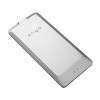- Qualcomm Launches Snapdragon 4 Gen 2 Mobile Platform
- AMD Launches Ryzen PRO 7000 Series Mobile & Desktop Platform
- Intel Launches Sleek Single-Slot Arc Pro A60 Workstation Graphics Card
- NVIDIA Announces Latest Ada Lovelace Additions: GeForce RTX 4060 Ti & RTX 4060
- Maxon Redshift With AMD Radeon GPU Rendering Support Now Available
OCZ Enyo 128GB USB 3.0 Portable SSD

“Fast”. It’s a word that can be explained in a billion different ways, but one of my favorites is to talk about the potential of OCZ’s Enyo SSD. As a portable drive, it delivers mind-blowing performance, at up to 200MB/s for both the read and write, and as an added perk, it’s small, stylish, and priced surprisingly well.
Page 3 – CrystalDiskMark, ATTO, Real-World
Over the past year, many storage companies have been jumping on the CrystalDiskMark bandwagon to help strut their product’s performance, and it’s easy to understand why. Compared to others, CrystalDiskMark delivers results that are much higher, and in some regards, they could be considered unrealistic given that real-world tests and even other synthetic benchmarks never seem to back up its claims. We include it for the sake of interest and because it is still a very thorough benchmark.


Super Talent’s drive managed to surpass the Enyo in our HD Tune test, but OCZ’s drive blasts back with improved CDM results. The read speeds are not all too different, but the write speeds certainly are, with Super Talent’s drive at about 102MB/s and OCZ’s at 178MB/s.
ATTO
While CrystalDiskMark does well to show the absolute top-end value of a storage device, ATTO doesn’t fall too far behind, if at all. Its test uses a wide-range of cluster sizes, for both read and write, but we only note 4KB, 64KB and 1024KB of the former. For those interested, we use a queue depth value of 10 for testing.

Although our graph puts OCZ’s drive on top, it actually only beat out Super Talent’s drive with the 4K reads. The SuperCrypt drive posted much-improved 64KB and 1024KB read performance.
Real-World
For real-world testing, we use a set of files and folders for the sake of measuring transfer speeds, and also convert images and music on the storage device to see just how well it fares for large intensive operations. For the transfer speeds, we use both 4GB and 16GB files and folders, and for the former, we also perform copy tests, which refers to copying the file or folder on the storage device. We don’t do this for our 16GB files and folders as some 32GB drives refuse it due to coming so close to the total density.

If I could rewrite the definition of “Fast”, I might say “Being able to copy a 4GB file in 22 seconds”. That averages out to 186MB/s! It’s a bit strange that the file and folder copy tests proved so much slower, but Super Talent’s drive exhibited the exact same issue. Even more odd might be that Kingston’s super-budget DT 101 G2 drive was the only one to have speeds faster for copying on the same drive as it did having the data written to it from our fast SSD. Of course, looking at the performance numbers, there’s still not too much to brag about there.

The 4GB performance we saw with the Enyo was impressive, but the 16GB performance is even more so. Our 16GB file copied over in 84 seconds, which is just about 195MB/s. We didn’t quite hit the quoted max write speed of 200MB/s, but we did far surpass the “sustained” write speed of 150MB/s.

It seemed unlikely that our Adobe Lightroom test would see much of a gain on a super-fast drive, compared to even a standard USB 2.0 device, but I’ve been proven wrong. The Enyo shaved about 12 seconds off of the same test compared to the Super Talent drive, and took an even more impressive 34 seconds off of our dBpoweramp test.
For some reason, the test performed quicker while the drive was in USB 2.0 mode for both tests. Color me confused about that one.
Support our efforts! With ad revenue at an all-time low for written websites, we're relying more than ever on reader support to help us continue putting so much effort into this type of content. You can support us by becoming a Patron, or by using our Amazon shopping affiliate links listed through our articles. Thanks for your support!





